Debts After Death: What Happens When There’s No Estate?
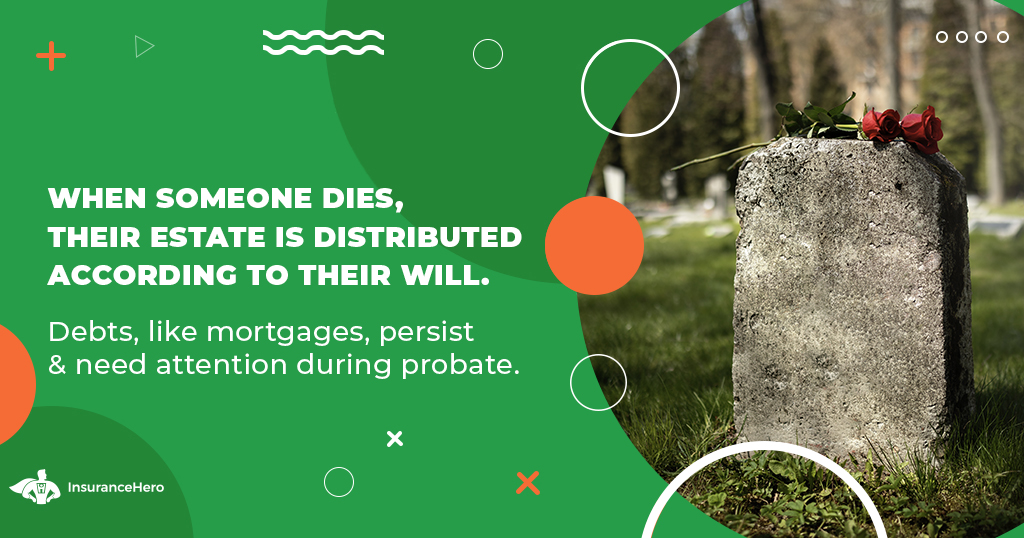
When someone passes away, the collective accumulated items they own, including everything from their prized fine china to their old furniture to the property and house they own, alongside the money in their bank and investment accounts, is summed up in one bundle called their Estate.
This Estate serves various purposes. For one thing, it is what the deceased’s descendants inherit.
The Estate may be given to one individual, divided among many, or even donated entirely to charity, according to the Will – the legal document, not their living desires – they have before their passing.
What happens, though, if the deceased had debt and no estates? A car loan, a mortgage, a personal loan, and credit card debts are all obligations the individual would be paying over time if they continued to live, but how do they apply after their passing?
Before we begin, we’ve seen many of the quirks of how this works, but we’re not experts in probate or estate administration. Many details of the process can derail the whole thing.
Fortunately, the government provides a guide and tool for sorting out an estate – the process of intestacy – that can help.
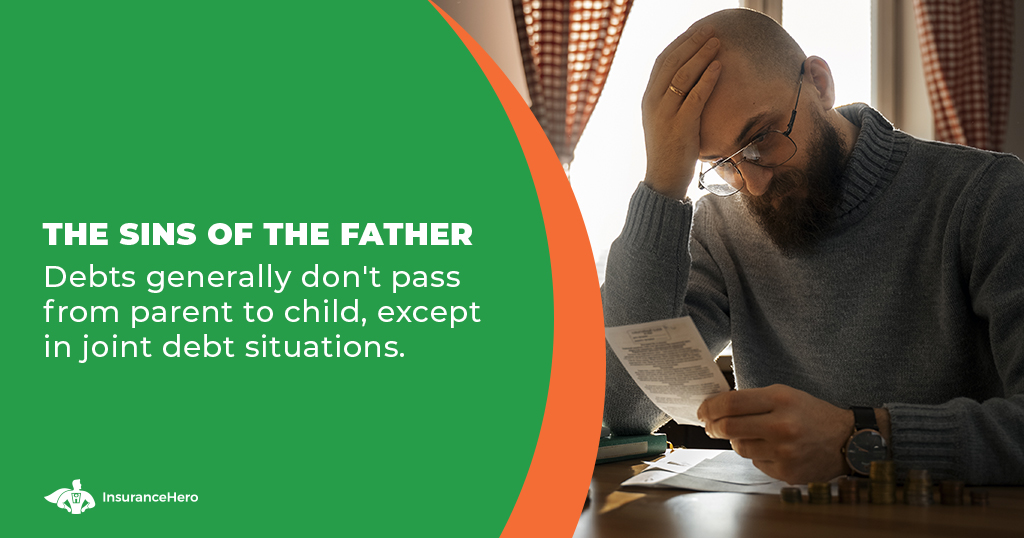
The Sins of the Father
Fortunately, one thing debt doesn’t do is pass on generationally. If a parent racks up minor or significant debt, that debt is their responsibility.
When they pass on, that debt is handled according to the ways we’ll discuss later in this article, but regardless of whether or not it is fully paid, any outstanding debt is written off. The descendants of the deceased are never responsible for paying their parents’ debts – with one exception.
That exception is a debt held jointly. If your father signs a 60-month loan to buy a car a year before his passing and then passes away, the car will likely be sold or returned to service the remaining debt, but any debt that isn’t paid is not your responsibility.
Note: This can happen in two different ways: Tenants in common and Joint tenants. Tenants in common is when two people own specified shares of a property. When one passes, any remaining debt needs to be cleared, and the surviving partner may be thrust into an uncomfortable situation depending on how it’s handled. With joint tenancy, the surviving tenant inherits the whole property, including potential debts.
However, if you and your father co-sign the loan for that debt, the car passes to you as co-owner, and so does the debt. The debt becomes your responsibility, but the benefit of that debt – the car itself – is yours. You are free to keep the car and pay the loan, or you can sell the vehicle and use the proceeds to pay the loan, but the choice is yours.
While you might assume that being married is a special case – that you would be responsible for your spouse’s debts when they pass – this isn’t the case either. Like children, spouses don’t inherit debts unless they co-signed for them as well.
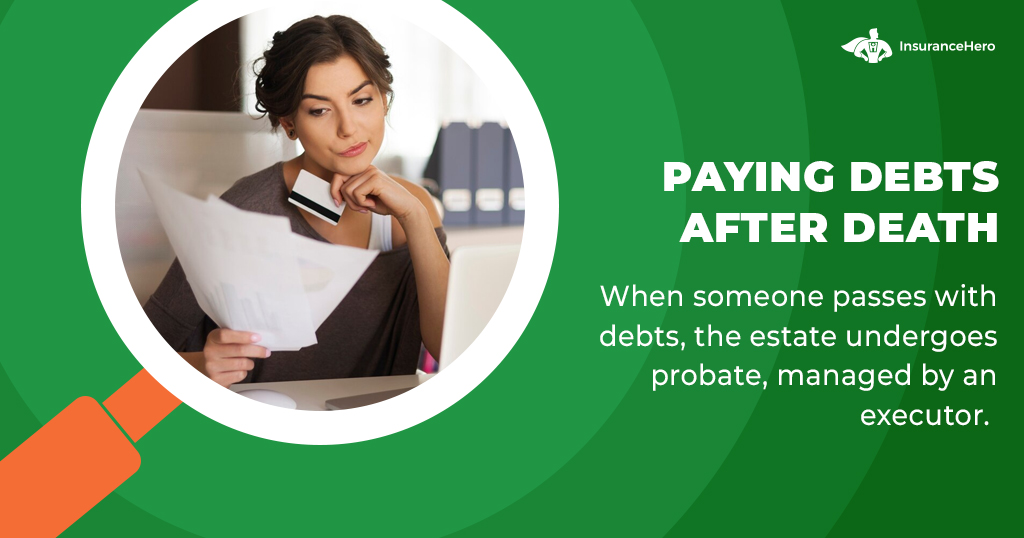
Paying Debts After Death
When someone has debts when they pass, those debts are handled the only way they can be: through the Estate.
Upon passing, the responsibility for the Estate is handed to an executor, and the Estate passes through a process known as probate. The Estate is codified and defined as liquid assets, illiquid assets, and debts.
The executor determines what order debts are to be paid, what illiquid assets are to be liquidated for the purpose, and how the Estate will be handled after the debts are paid.
In the best cases, this can be a lengthy process with minimal debts, a simple estate, and a clear will with no contest from heirs or beneficiaries.
When any of those isn’t true – a complex estate, no will, contentious heirs – probate can take quite a long time. In an ideal situation, it can take 1-3 months; when it’s more complex and needs details sorted through, it can take six months or longer.
The executor is responsible for categorising and distributing assets from the Estate among creditors and beneficiaries. However, despite being in charge, they aren’t responsible for any of the debts themselves.
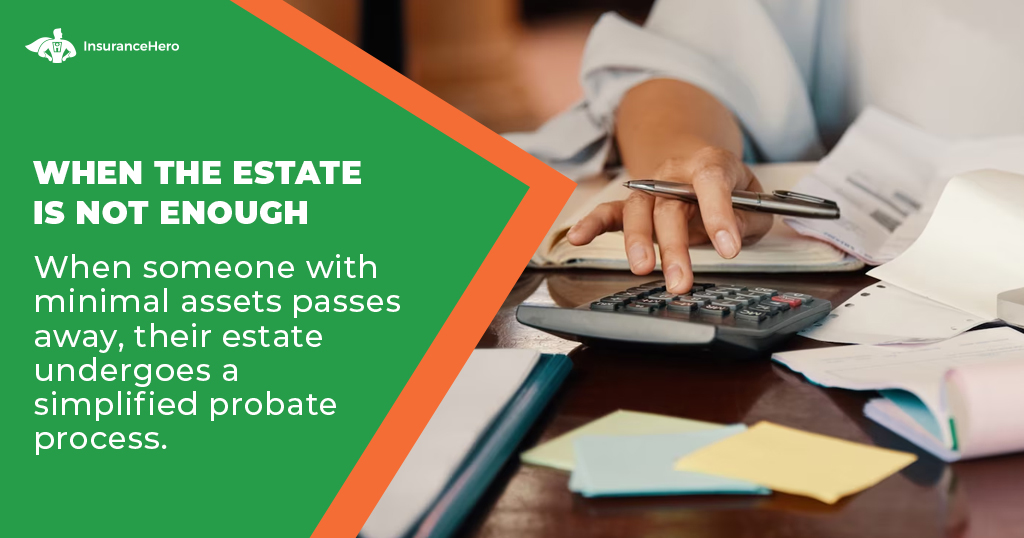
When There is No Estate (Or The Estate is Not Enough)
Sometimes, a person passes without much to their name. Maybe they were renting a flat until their move to hospice, so they didn’t own property. Maybe their savings were reduced over a long retirement, end-of-life care, and expenses. Whatever the case may be, they passed away with little to their name and some outstanding debts.
What happens then?
Like any other instance, the Estate – whatever remains of it – is put into probate. It’s likely a straightforward probate process because there’s nothing much to review or categorise. Creditors want their debt repaid, but when there are no assets to be divvied up, they’re out of luck.
There’s a defined process here, even if little or no assets remain in the Estate. All remaining debts are categorised. From there, the Estate is used to pay off those debts in priority order until there’s nothing left of the Estate. Any creditors remaining unpaid have to write off the remaining debt.
They can’t pursue the executor or administrator of the Estate, nor can they go after the descendants or beneficiaries of the Estate (such as they are; with no estate remaining, those beneficiaries don’t precisely benefit.)
Again, if any of the debts were co-signed, the second party legally becomes responsible for the debt. For debts signed only in the name of the deceased, they evaporate when there are no longer ways to pay them.
The process looks a little something like this
Step one: notification. The executor or administrator of the Estate will send notice to creditors that the deceased has died. An effort will also be made to reach previously unknown creditors, usually by putting a notice in a local paper.
Creditors whose known information will be contacted and asked to provide a statement of the remaining debt amount. This statement becomes the amount they need to pay to satisfy the debt.
Note: In rare cases, a debt slips through the cracks, and the creditor is not notified. Suppose the Estate still has some remaining assets, which go to a beneficiary when there’s still a debt that should be paid.
In that case, the creditor can pursue the beneficiary for the amount of the debt. This can sometimes result in a legal battle, so it’s worth extra care during this process.
Step two: gathering assets. In cases with no estate or a smaller estate, it’s relatively easy to gather and liquidate everything relevant to the debts that must be paid. Larger estates can be more complex but are less likely to run into debts that can’t be repaid.
A big one here is life insurance. If the deceased had a life insurance policy, the death benefit would be paid out. Life insurance payments will typically go to the beneficiary and not into the Estate.
However, if no specific beneficiary can claim it, it is used as part of the Estate and may be used to pay off remaining debts. There are potential ways around this, which we’ll discuss later.
Additionally, different life insurance policies may have different terms and conditions, and some may specify that they are added to the Estate and can go towards paying off the debt.
Step three: paying debts. Debts after death are organised in what is called priority order, and that priority determines which creditors are paid first and which ones are left holding the bag when there are no remaining assets in the Estate.
So, what is the priority order?
- First is secured debts. Secured debts are debts that have an asset tied to them as security in the event of nonpayment. A mortgage, for example, is a secured debt; if the mortgage goes unpaid, the house is foreclosed on and liquidated to pay off the mortgage. Car loans and other similar asset-tied loans are secured debts as well. Secured debts generally repossess the asset they were securing. If that isn’t enough to pay off the remaining debt, the creditor can pursue the Estate for the remaining balance. Depending on the remaining balance and the state of the Estate, the creditors may decide it isn’t worth the effort and write off the rest.
- The second priority debt category is, confusingly, priority debt. These are debts owed to priority entities like the local council or the government, such as income tax, council tax, and similar. They are paid after secured debts but before unsecured debts.
- The third, then, is unsecured debts. These can range from personal loans and loans without collateral to credit card debts and accumulated bills, like utility bills. If the Estate has run dry by this point, all of these creditors are out of luck, and the debts are generally written off.
Within each category, a decision must be made on how the debts are paid back. This decision is made by the executor or administrator of the Estate and is a large part of why the probate process can take as long as it does.
Any debts co-signed or jointly owned do not factor in this process and are referred to the surviving partner. A secured debt in the name of two people doesn’t get paid from the Estate; the debt passes on to the second person.
However, if an estate is left over, the survivor can choose to liquidate part or all of it to satisfy the debt so it doesn’t become their burden.
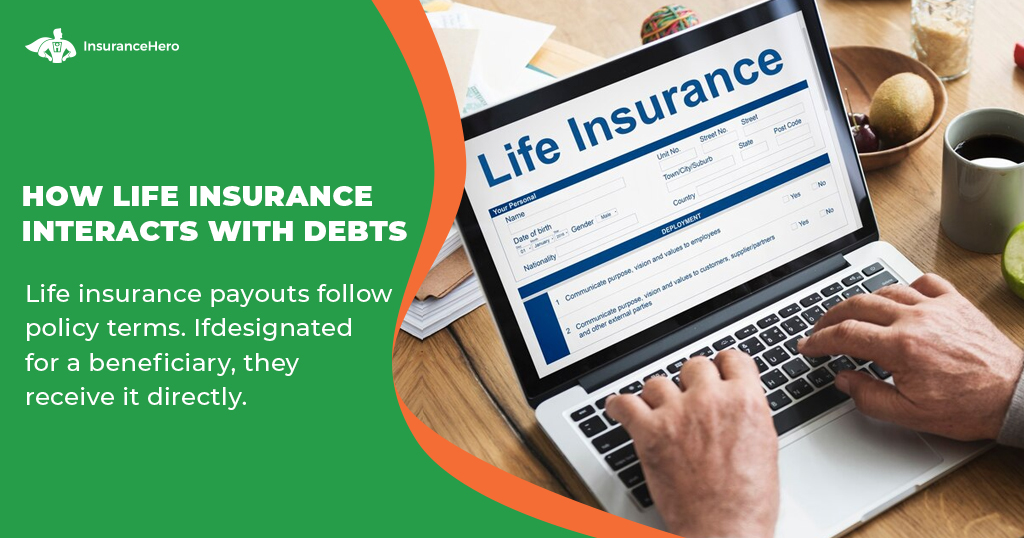
How Life Insurance Interacts with Debts
Most life insurance coverage is paid out after death and is handled according to the policy’s terms.
Generally, there are a few different ways this can go.
If the life insurance policy states that the payment goes directly to the beneficiary and the beneficiary is alive to receive it, the payment goes directly to them. They can then use it as they wish.
If the life insurance policy is transferred to the Estate instead, the lump sum is transferred into the same account as the rest of the Estate and treated as part of the Estate’s assets. That means it can be used to pay off debts rather than going directly to the beneficiary.
If there’s no will, the life insurance payout is paid according to policy terms, and if it goes to the Estate, it is handled according to the executor’s determinations.
If a life insurance policy remains unclaimed after the insured’s death, it will sit in limbo for up to 15 years, after which it is turned over to the government as part of dormant assets and used for charity.
Depending on the insurance provider, if a valid claim is later made, they may or may not still pay out.
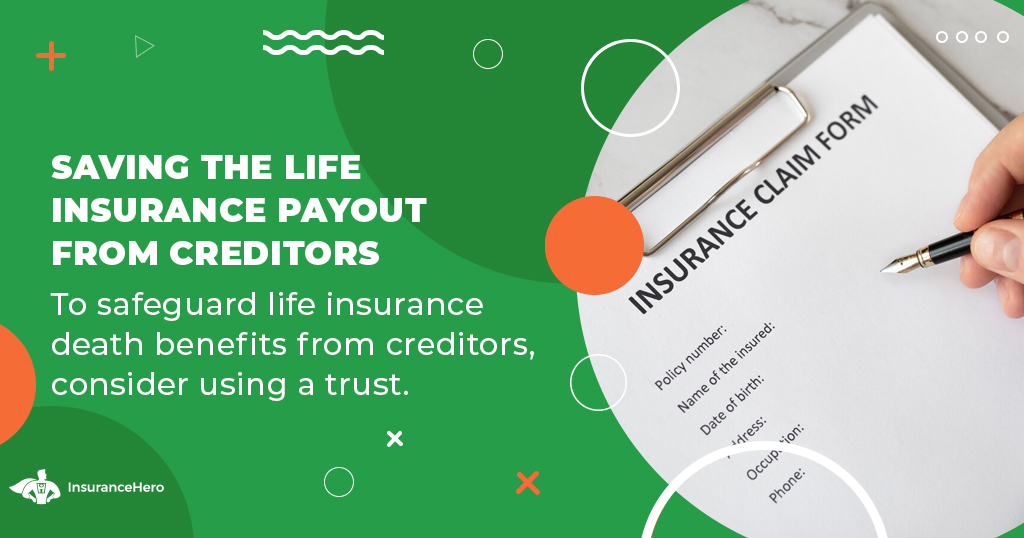
Saving the Life Insurance Payout from Creditors
One concern you may have is whether or not you can “save” your life insurance death benefits from your creditors after you pass. Is there a way to ensure your payout goes to your beneficiaries solely and entirely rather than being picked over by creditors first?
The answer is, usually, a trust. By putting your life insurance in a trust and guiding the trust to pay it to your beneficiaries, you can avoid having it be part of the probate process and Estate.
There are many quirks to this, and you’re subject to additional taxes on the payout, but it’s one way to control what happens to the asset after your passing.

Securing the Future for Your Descendants
Life insurance is one of the best ways to secure the future for your spouse, loved ones, children, or other beneficiaries you want to support after you’re gone.
Life insurance is a great way to secure that future if you have a minimal estate or want something to flow to your descendants outside the probate process.
Fortunately, it’s also easy to get quotes and sign up. At Insurance Hero, we’ve developed a robust tool to help you gather quotes and pick the best policy in minutes. All you need to do is click here to get started.
Steve Case is a seasoned professional in the UK financial services and insurance industry, with over twenty years of experience. At Insurance Hero, Steve is known for his ability to simplify complex insurance topics, making them accessible to a broad audience. His focus on clear, practical advice and customer service excellence has established him as a respected leader in the field.


